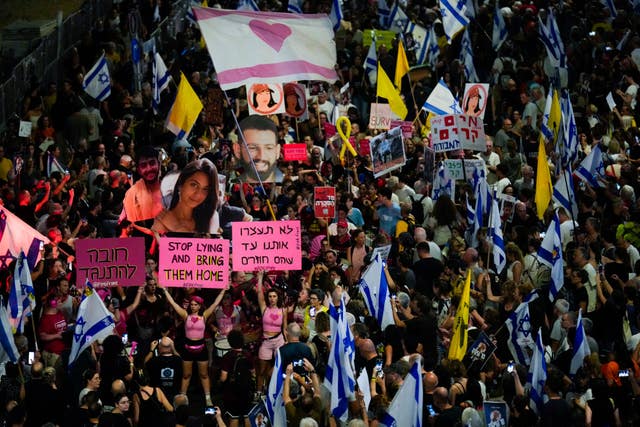Israeli missile strike on Gaza humanitarian area kills and wounds dozens
Military officials said the strike hit ‘significant Hamas terrorists’ but did not provide additional evidence.

An Israeli strike on a crowded tent camp housing Palestinians displaced by the war in Gaza killed at least 40 people and wounded 60 others early Tuesday, Palestinian officials said.
Israel said it targeted “significant” Hamas militants, allegations denied by the militant group.
The Civil Defense, first responders operating under the Hamas-run government, said it had recovered 40 bodies from the strike in a designated humanitarian zone known as Mawasi and was still looking for people.
It said entire families had been killed as they huddled in tents.

An Associated Press cameraman saw three large craters at the scene, where first responders and displaced people were sifting through the sand and rubble with garden tools and their bare hands by the light of mobile phones after the predawn strike.
The Nasser Hospital in Khan Younis, one of three hospitals to receive casualties, said around two dozen bodies had been brought in from the strike
The Israeli military said it had struck Hamas militants who were operating in a command-and-control centre, using precise munitions, aerial surveillance and other means to avoid civilian casualties.
Israel says it has tried to avoid harming civilians throughout the 11-month war ignited by Hamas’ October attack.
It blames Hamas for their deaths because the militants often operate in residential areas and are known to position tunnels, rocket launchers and other infrastructure near homes, schools and mosques.
Hamas released a statement denying any militants were in the area. Neither Israel nor Hamas provided evidence to substantiate their claims.
The war has caused vast destruction and displaced around 90% of Gaza’s population of 2.3 million, often multiple times. Israeli evacuation orders, which now cover around 90% of the territory, have pushed hundreds of thousands of people into Mawasi, a sprawling line of squalid tent camps along the coast.
Aid groups have struggled to provide even basic services in Mawasi, and Israel has occasionally struck targets there despite designating it as a humanitarian zone.
Gaza’s Health Ministry says more than 40,000 Palestinians have been killed in Gaza since the war began. It does not differentiate between fighters and civilians in its count.
Hamas-led militants killed some 1,200 people, mostly civilians, in their October 7 attack.
They abducted another 250 people and are still holding around 100 after releasing most of the rest in exchange for Palestinians imprisoned by Israel during a weeklong cease-fire last November.
Around a third of the remaining hostages are believed to be dead.
The main UN agency providing aid to Palestinians said the Israeli military stopped a convoy for more than eight hours on Monday, despite coordinating with the troops.
United Nations Relief and Works Agency for Palestine Refugees in the Near East head Philippe Lazzarini said the staffers who were held had been trying to work on a polio vaccination campaign in northern Gaza and Gaza City.
“The convoy was stopped at gunpoint just after the Wadi Gaza checkpoint with threats to detain UN staff,” he wrote on the social platform X. “Heavy damage was caused by bulldozers to the UN armoured vehicles.”
He said the staff and the convoy later returned to a U.N. base, but it was unclear if a polio vaccination campaign would take place Tuesday in northern Gaza.
The Israeli military did not immediately respond to a request for comment.
The vaccination drive, launched after doctors discovered the first polio case in the Palestinian enclave in 25 years, aims to vaccinate 640,000 children during a war that has destroyed the healthcare system.





